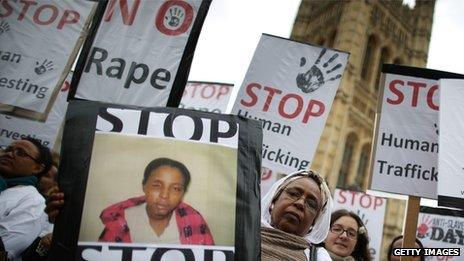Anti-slavery laws 'must focus on victims', say MPs
- Published

A proposed new law to combat modern-day slavery needs to be strengthened, with more attention given to victims of trafficking, MPs and peers have said.
A special committee of parliamentarians said it backed the Slavery Bill's aims but urged major changes, including more protection for children, enhanced legal support and compensation for victims.
It also said criminal offences should be simplified to help get convictions.
Traffickers and slavemasters face possible life sentences under the plans
Home Secretary Theresa May announced plans to crack down on human trafficking and other forms of modern-day slavery last August.
The Modern Slavery Bill, which was published in November, aims to consolidate the offences used to prosecute those who enslave others into a single act.
Under the government's plans, those convicted of the most serious offences could get a maximum life sentence, up from 14 years at the moment, while a new post of anti-slavery commissioner will be created to hold law enforcement and other organisations to account.
'Heinous'
A special committee set up to scrutinise the bill said it was right that the government had recognised the "heinous crime" of slavery. which it said could take a multitude of forms - including forced prostitution, forced labour, domestic servitude in the home, and forced criminal activity such as marijuana farming.
But it said sweeping changes were needed to the legislation to make it more effective, including simplifying the number of proposed criminal offences into six categories: slavery of children and adults, child exploitation, exploitation, child trafficking, trafficking and facilitating the commission of an offence of modern slavery.
The committee also calls for:
- More support for victims to claim compensation, including a legal fund
- A new system of children's advocates
- No prosecution of enslaved people for crimes that they were forced to commit
- A stronger asset recovery regime to seize illicit gains
- A rethink of recent changes to visa rules for domestic workers
- Companies to report on efforts to eradicate slavery from their supply chains
- The anti-slavery commissioner to be truly independent
- The legislation to be continuously reviewed
Labour MP Frank Field, who chairs the committee, said the legislation was "ground-breaking" and would influence the fight against modern slavery around the globe.
But he said parts of the bill needed to be totally rewritten, not simply amended.
"The shift to the focus on victims is not only the morally right thing to do in and of itself, it is essential if we are to get the prosecutions necessary to try to end this evil," he said.
'World watching'
"The world is watching: we have to get this right.
"In the 19th Century British politicians sought to abolish the international slave trade and end one of the most deplorable practices in history. Their hard-fought victory remains one of our Parliament's finest achievements.
"We must not betray that legacy - or the victims of slavery.
"We must make life as difficult as possible for today's slave masters and traffickers, and the position of the victims of slavery must be transformed."
Crossbencher peer Baroness Butler-Sloss said the bill as it stood "overlooked the position of victims both as victims in need of support, but also as essential to getting convictions".
"Unless and until the protection of victims, and the provision of support and services to them, are put on a statutory footing at the heart of this legislation, there is a risk that we will turn victims into criminals," she said.
"Apart from the fact that this would be morally wrong, it is also self-defeating."
Complexity
Children's charity Unicef also urged the government to strengthen the proposals in its bill, by including measures to provide trafficked children with legal guardians.
"Even when trafficked children are identified they remain vulnerable and separated from their families. They face frightening interviews with various authorities and don't always receive the protection they need," the charity said.
Unicef UK's deputy executive director Anita Tiessen said legal guardians would ensure the victims were "protected by law and have a chance to rebuild their lives".
"Guardians must be independent, established in law and given legal powers so that children get the support they need to stay safe," she added.
The committee's report has been endorsed by Hollywood director Steve McQueen, whose film 12 Years A Slave won the best film at last month's Oscars and drew attention to the historical legacy of slavery.
"They have listened to the evidence and considered it with great care," he said.
"Their recommendations are humane and principled.
"More than that they have grasped the complexity of contemporary trafficking and forced labour in the United Kingdom and have set forth clearly the fundamentals of what is necessary to tackle it effectively."
- Published16 December 2013
- Published24 November 2013
- Published25 August 2013